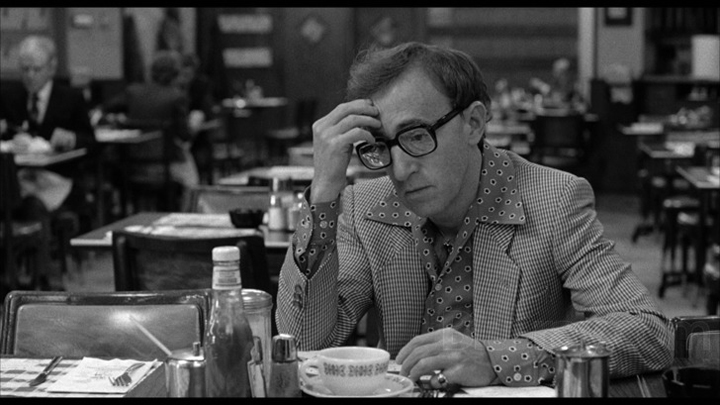
I propose four intertwined and yet distinct categories of Allen's anxieties: (1) over relationships, love, and commitment; (2) over the presence/absence of God, order, and justice in the universe; (3) over the relationship between art and life; and (4) over the presence of evil and combating it. Among these, three are curable and only one is intractably incurable. The fundamental question is: which one?
Relationships
At the end of Annie Hall, Alvy Singer, played by Allen, famously says to the audience, ". . . that's pretty much how I feel about relationships. You know, they're totally irrational and crazy and absurd and . . . but, uh, I guess we keep goin' through it because, uh, most of us need the eggs." This "keep goin'" may be absurd, but it's not masochistic. Allen's anxiety produced by relationships is crazily curable. The reason is his absolute belief that the prospect of a happy and long love is a reality. The hope of marriage with the right person—or of sustaining relationships—triumphs, or at least is given a chance, in practically all of his films. When things don't work out, as in Annie Hall, Manhattan, and The Purple Rose of Cairo, there's sadness, but again, much more than a hint of hope. The idea of "husbands and wives" is a broad moral and existential concept for Allen. Suffused with fascination, anxiety, and ironic and comedic twists, it produces a cure predicated on the possibility and fragile knowledge of love that works.
God/Justice
In the 2014 Magic in the Moonlight Stanley Crawford, played by Colin Firth, fears that his elderly aunt might die during her surgery. He begins, for the first time in life, to pray to God. "Who am I kidding," he quickly interrupts his supplication. The cold-blooded Stanley, a British aristocrat, quickly gets over his "God" problem, a merely insignificant source of anxiety. In this he is an aberration in Allen's body of work, an exception that only proves the rule.
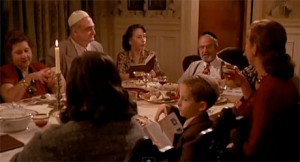
Here's the paradox: the issue at hand is deeply insoluble and its insolubility makes the anxiety caused by it curable. To use Lionel Trilling's term, Allen's imagination is a moral one. His practice is to keep it in perpetual motion through the constant reexamination of the same moral questions, run through cinematic parables, situations, and plot lines. In its incessancy it is rabbinic, Socratic, and perhaps Freudian. If it is a Sisyphean task, for Allen it is anxiety relieving rather than anxiety producing.
Art/Life
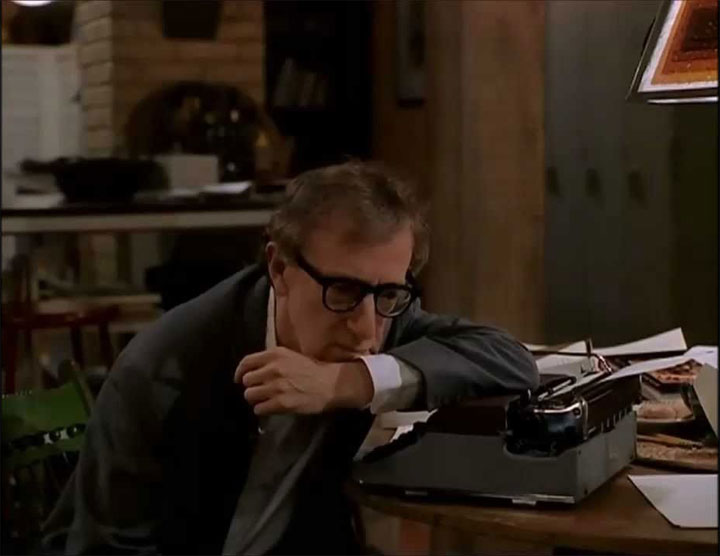
A question with deep echoes in Jewish history drives Allen's art/life anxiety. How to learn to live in the world without sacrificing one's essence and destroying oneself? In resolving it, he behaves as a nuanced moralist and a conservative thinker. Unlike Block, Woody Allen wants to be able to function in art and life, without one corroding the other. The trick is not to disparage life or idealize art, but to find a compromise. For his characters, this bargain often takes on a tragic or deeply neurotic dimension. The art/life compromise of Allan Konigsberg—artist, person, and Jew—pacifies tragedy and anxiety. Unlike the Robin Williams character in Deconstructing Harry, he keeps himself in focus without the magic glasses.
Evil
In "Wordsworth and the Rabbis," Lionel Trilling praised talmudic rabbis for "their non-militancy, their indifference to the idea of evil, their acceptance of cosmic contradiction." Disregarding the accuracy of Trilling's assessment of the rabbinic mindset, his terminology helps in diagnosing Woody Allen's last anxiety—his only incurable and hence most painful one.
Unlike Trilling's rabbis, Allen is never indifferent to the idea of evil. And if like them, he does accept the "cosmic contradiction," he does so as long as it signifies the perpetual presence of evil in history and the world. He is a nuanced moralist, but a moralist nonetheless, and therefore operates with distinct and unequivocal moral categories. None of the positive outcomes in his cinematic universe can adequately contradict Frederick's (von Sydow) pronouncement in Hannah and Her Sisters regarding the Holocaust, "The reason why they could never answer the question 'How could it possibly happen?' is that it's the wrong question. Given what people are, the question is 'Why doesn't it happen more often?' Of course it does, in subtler forms." Frederick does not relativize the Holocaust or diminish its unprecedented nature. He sees it, for all intents and purposes, as never ending. Thus, Allen's anxiety is not over what evil is or whether it exists or not, but over how to respond to it: the issue, to return to Trilling, of militancy versus nonmilitancy. For Allen the two options are thoroughly grounded in Jewish experience, making his angst over them deeply personal and often masked.
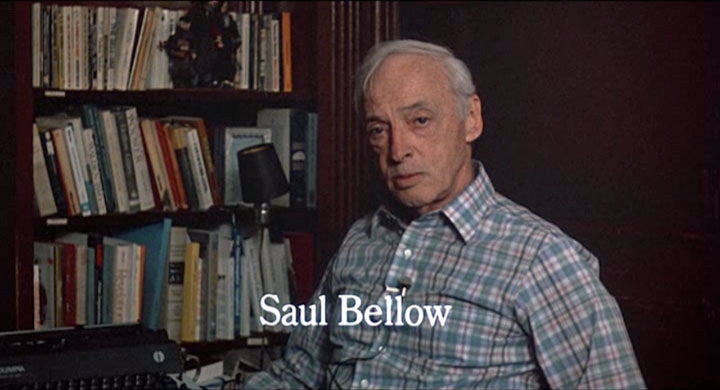
This intensely symbolic and unnerving scene mirrors Allen's incurable anxiety and dilemma. At times, he temporarily resolves it in favor of Eisen, as in the underrated Anything Else, where Dobel, played by Allen, wants to avenge the world for the Holocaust. He is comedic and crazy, but also resolutely and admirably militant in his response to anything and anyone he recognizes as evil. In many of his other films, however, Allen cannot shake off the moral messiness of this decisiveness, as if repeating after Sammler, "This is the man." Such is the philosophy of the beautifully nonmilitant comedic Jewish saint Danny in Broadway Danny Rose and also why the prototypical Kafkaesque Jew Kleinman opts for magic in Shadows in the Fog, fully realizing that the notion that it can capture evil is both an illusion and a delusion.
This incurable anxiety, I would suggest, is the reason why Allen never confronts Israel in his films, whose "anxieties of political self-rule," to quote Ruth Wisse, bring into the sharpest focus the militancy/nonmilitancy conundrum. It would not be an exaggeration to say that Woody Allen's unexpressed anxiety is our time's most explicit, open, and divisive one.

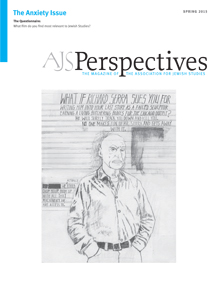
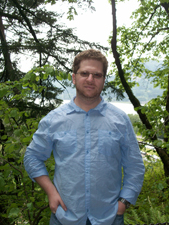 Marat Grinberg is associate professor of Russian and Humanities at Reed College. He's the author of "I am to Be Read not from Left to Right, but in Jewish: from Right to Left": The Poetics of Boris Slutsky (Academic Studies Press, 2013) and co-editor of Woody on Rye: Jewishness in the Films and Plays of Woody Allen (Brandeis, 2013). His most recent essays have appeared in Commentary, Tablet Magazine, Shofar, and Post Script: Essays in Film and the Humanities. He's currently writing a book about the Soviet film Commissar (1967) to be published by Intellect Books in their new KinoSputnik series.
Marat Grinberg is associate professor of Russian and Humanities at Reed College. He's the author of "I am to Be Read not from Left to Right, but in Jewish: from Right to Left": The Poetics of Boris Slutsky (Academic Studies Press, 2013) and co-editor of Woody on Rye: Jewishness in the Films and Plays of Woody Allen (Brandeis, 2013). His most recent essays have appeared in Commentary, Tablet Magazine, Shofar, and Post Script: Essays in Film and the Humanities. He's currently writing a book about the Soviet film Commissar (1967) to be published by Intellect Books in their new KinoSputnik series.